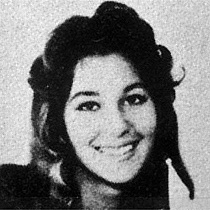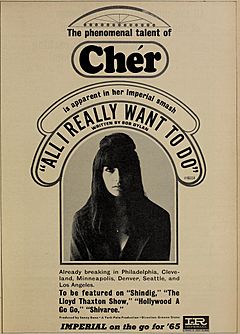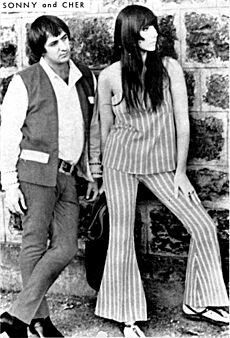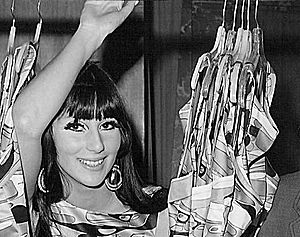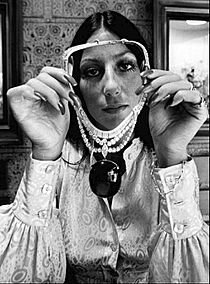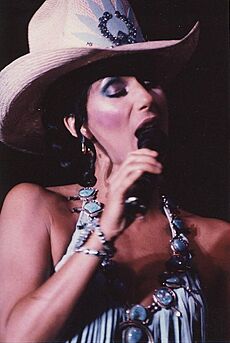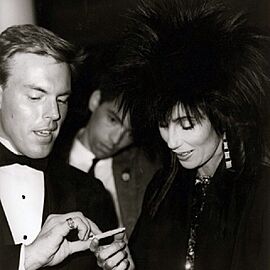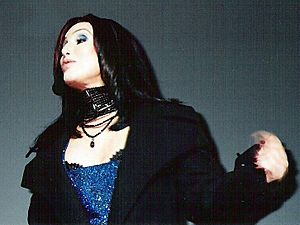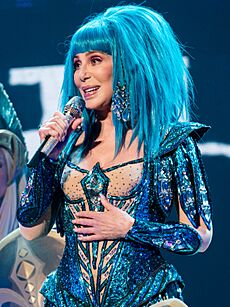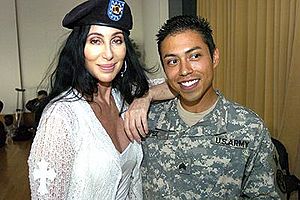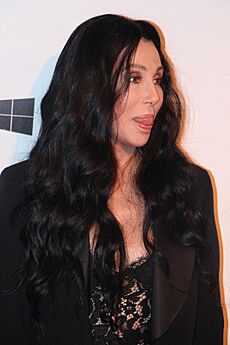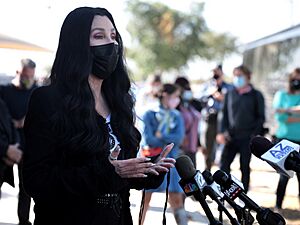Cher facts for kids
Quick facts for kids
Cher
|
|
|---|---|

Cher in 2020
|
|
| Born |
Cheryl Sarkisian
May 20, 1946 |
| Other names |
|
| Occupation |
|
| Years active | 1963–present |
|
Works
|
|
| Spouse(s) |
|
| Partner(s) | Alexander Edwards |
| Children |
|
| Parent(s) |
|
| Awards |
|
| Musical career | |
| Genres | |
| Instruments | Vocals |
| Labels |
|
| Signature | |
 |
|
Cher (/ʃɛər/ shair; born Cheryl Sarkisian; May 20, 1946) is an American singer, actress and television personality. Dubbed the "Goddess of Pop", she is known for her androgynous contralto voice, multifaceted career and bold visual presentation, while cultivating a screen persona that mirrors her public image by often portraying strong-willed, independent and outspoken women. Her adaptability has fueled multiple comebacks, cementing her status as a cultural icon. She is the only solo artist with Billboard number-one singles in seven consecutive decades, from the 1960s to the 2020s. Her accolades include an Academy Award, a Primetime Emmy Award, a Grammy Award, three Golden Globe Awards, the Billboard Icon Award, the Kennedy Center Honor and an induction into the Rock and Roll Hall of Fame. Cher is one of the best-selling music artists of all time, with estimated sales of over 100 million records worldwide.
Cher gained fame in 1965 as part of the folk rock husband-wife duo Sonny & Cher, while also achieving solo success with top-ten singles including "All I Really Want to Do" and "Bang Bang (My Baby Shot Me Down)". In the 1970s, she divorced from Sonny Bono and topped the US Billboard Hot 100 with "Gypsys, Tramps & Thieves", "Half-Breed" and "Dark Lady", becoming the female solo artist with the most number-one singles in US history at the time. Following a hiatus to focus on acting, she returned to music with the rock-inflected albums Cher (1987), Heart of Stone (1989) and Love Hurts (1991), earning international number-one singles with "If I Could Turn Back Time" and "The Shoop Shoop Song (It's in His Kiss)".
Cher reached a commercial peak with the dance-pop album Believe (1998), which introduced the "Cher effect", an extreme, stylistic use of Auto-Tune to distort vocals. The title track became 1999's number-one song in the US and the UK's best-selling single by a female artist. 21st-century releases include Closer to the Truth (2013) and Dancing Queen (2018), both debuting at number three on the Billboard 200 and becoming her highest-charting solo albums in the US. Her 2002–2005 Living Proof: The Farewell Tour was the highest-grossing concert tour by a female artist at the time, earning US$250 million (about $370 million in 2022).
Cher became a television star in the 1970s with The Sonny & Cher Comedy Hour and her solo show Cher, both on CBS, attracting over 30 million weekly viewers. She debuted on Broadway in 1982 with Come Back to the 5 & Dime, Jimmy Dean, Jimmy Dean and starred in its film adaptation, earning critical acclaim. Transitioning to film, Cher received two Academy Award nominations for Silkwood (1983) and Moonstruck (1987), winning Best Actress for the latter, and won the Cannes Film Festival Award for Best Actress for Mask (1985). Her other starring roles include The Witches of Eastwick (1987), Mermaids (1990), If These Walls Could Talk (1996, her directorial debut), Tea with Mussolini (1999), Burlesque (2010) and Mamma Mia! Here We Go Again (2018). Her life and career inspired the 2018 jukebox musical The Cher Show. Cher is vocal about her progressive political views, and has advocated and fundraised for causes including LGBTQ rights and HIV/AIDS prevention.
Contents
- Life and career
- 1946–1961: Early life
- 1962–1967: Solo musical breakthrough and Sonny & Cher
- 1967–1970: From counterculture icon to lounge act
- 1971–1974: Television stardom and first musical comeback
- 1974–1979: Divorce from Sonny Bono, marriage to Gregg Allman and decline in popularity
- 1979–1982: Second musical comeback, from disco success to leading a rock band
- 1982–1987: Broadway debut, acting breakthrough and musical hiatus
- 1987–1992: Hollywood stardom and third musical comeback
- 1992–1998: From A-list actress to infomercial queen, death of Sonny Bono
- 1998–2002: Fourth musical comeback and songwriting debut
- 2002–2018: Farewell tours, concert residencies and return to acting and recording
- 2018–2022: ABBA-related projects and ventures in fashion
- 2023–present: Christmas, Rock and Roll Hall of Fame induction and memoirs
- Artistry
- Activism
- Legacy
- Achievements
- Discography
- Tours and residencies
- Filmography
- See also
Life and career
1946–1961: Early life
Cher was born Cherilyn Sarkisian in El Centro, California, on May 20, 1946. Her father, John Sarkisian, was an Armenian-American truck driver with gambling problems; her mother, Georgia Holt (born Jackie Jean Crouch), was a former model and retired actress who claimed Irish, English, German, and Cherokee ancestry. Her paternal grandparents were Armenian Genocide survivors. Cher's father was rarely home when she was an infant, and her parents divorced when Cher was ten months old. Her mother later married actor John Southall, with whom she had another daughter, Georganne, Cher's half-sister.
Moving to Los Angeles, Cher's mother began acting while working as a waitress. She changed her name to Georgia Holt and played minor roles in films and on television. Holt also secured acting parts for her daughters as extras on television shows like The Adventures of Ozzie and Harriet. Her mother's relationship with Southall ended when Cher was nine years old, but she considers him her father. Holt remarried and divorced several more times, and she moved her family around the country (including New York, Texas, and California). They often had little money, and Cher recounted having had to use rubber bands to hold her shoes together. At one point, her mother left Cher at an orphanage for several weeks. Although they met every day, both found the experience traumatic.
When Cher was in fifth grade, she produced a performance of the musical Oklahoma! for her teacher and class. She organized a group of girls, directing and choreographing their dance routines. Unable to convince boys to participate, she acted the male roles and sang their songs. By age nine, she had developed an unusually low voice. Fascinated by film stars, Cher's role model was Audrey Hepburn, particularly due to her role in the 1961 film Breakfast at Tiffany's. Cher began to take after the unconventional outfits and behavior of Hepburn's character. She was also inspired by Marlene Dietrich, Bette Davis, and Katharine Hepburn. She was disappointed by the absence of dark-haired Hollywood actresses whom she could emulate. She had wanted to be famous since childhood but felt unattractive and untalented, later commenting, "I couldn't think of anything that I could do ... I didn't think I'd be a singer or dancer. I just thought, well, I'll be famous. That was my goal."
In 1961, Holt married bank manager Gilbert LaPiere, who adopted Cher (under the name Cheryl LaPiere) and Georganne, and enrolled them at Montclair College Preparatory School, a private school in Encino, whose students were mostly from affluent families. The school's upper-class environment presented a challenge for Cher; biographer Connie Berman wrote, "[she] stood out from the others in both her striking appearance and outgoing personality." A former classmate commented, "I'll never forget seeing Cher for the first time. She was so special ... She was like a movie star, right then and there ... She said she was going to be a movie star and we knew she would." Despite not being an excellent student, Cher was intelligent and creative, according to Berman. She earned high grades, excelling in French and English classes. As an adult, she discovered that she had dyslexia.
1962–1967: Solo musical breakthrough and Sonny & Cher
At 16, Cher left school and moved out of her mother's house to live with a friend. She took acting classes and supported herself by dancing in nightclubs along Hollywood's Sunset Strip, where she introduced herself to performers, managers and agents. According to Berman, "[Cher] did not hesitate to approach anyone she thought could help her get a break". Cher met performer Sonny Bono in November 1962 when he was working for record producer Phil Spector. Cher's friend moved out and Cher accepted Sonny's offer to be his housekeeper. Sonny introduced Cher to Spector, who used her as a backup singer on many recordings, including the Ronettes' "Be My Baby" and the Righteous Brothers' "You've Lost That Lovin' Feelin'". Spector produced her first single, "Ringo, I Love You", which Cher recorded under the name Bonnie Jo Mason. Many radio programmers rejected the song, mistaking Cher's deep contralto for a man's voice.
Cher and Sonny became close friends, eventual lovers and performed their own unofficial wedding ceremony in a hotel room in Tijuana, Mexico, on October 27, 1964. Although Sonny had wanted to launch Cher as a solo artist, she encouraged him to perform with her because she suffered from stage fright and he began joining her onstage, singing the harmonies. Cher disguised her nervousness by looking at Sonny; she later commented that she sang to the people through him. In late 1964, they emerged as a duo called Caesar & Cleo, releasing the poorly received singles "Do You Wanna Dance?", "Love Is Strange" and "Let the Good Times Roll".
Cher signed with Liberty Records' Imperial imprint in the end of 1964 and Sonny became her producer. The single "Dream Baby", released under the name "Cherilyn", received airplay in Los Angeles. Imperial encouraged Cher to work with Sonny on her second solo single for the label, a cover of Bob Dylan's "All I Really Want to Do". It peaked at number 15 on the US Billboard Hot 100 and number nine on the UK Singles Chart in 1965. Meanwhile, the Byrds had released their own version of the same song. When competition on the singles charts started between Cher and the Byrds, the group's record label began to promote the B-side of the Byrds' single. Roger McGuinn of the Byrds commented, "We loved the Cher version ... We didn't want to hassle. So we just turned our record over." Cher's debut album, All I Really Want to Do (1965), reached number 16 on the Billboard 200; it was later described by AllMusic's Tim Sendra as "one of the stronger folk-pop records of the era".
In early 1965, Caesar and Cleo began calling themselves Sonny & Cher. Following the recording of "I Got You Babe", they traveled to England in July 1965 at the Rolling Stones' advice; Cher recalled, "[they] had told us ... that Americans just didn't get us and that if we were going to make it big, we were going to have to go to England." According to writer Cintra Wilson,
English newspaper photographers showed up when S&C were thrown out of the London Hilton [because of their outfits] the night they arrived—literally overnight, they were stars. London went gaga for the heretofore-unseen S&C look, which was neither mod nor rocker.
"I Got You Babe" reached number one on the Billboard Hot 100 chart and became, according to AllMusic's Bruce Eder, "one of the biggest-selling and most beloved pop/rock hits of the mid-'60s"; Rolling Stone listed it among "The 500 Greatest Songs of All Time" in 2003. As the song knocked the Beatles off the top of the British charts, English teenagers began to emulate Sonny and Cher's fashion style, such as bell-bottoms, striped pants and fur vests. Upon their return to the US, the duo made several appearances on the teen-pop showcases Hullabaloo and Shindig! and completed a tour of some of the largest arenas in the US. Their shows attracted Cher look-alikes, with girls straightening and dyeing their hair black to emulate her style, often pairing it with vests and bell-bottoms.
Sonny and Cher's first album, Look at Us (1965), released for the Atco Records division of Atlantic Records, spent eight weeks at number two on the Billboard 200, behind the Beatles' Help!. The duo successfully competed with the dominant British Invasion and Motown sounds of the era. Author Joseph Murrells described Sonny and Cher as "leading exponents of the rock-folk-message type of song", blending rock instrumentation with folk themes and protest lyrics. They charted ten Billboard top 40 singles between 1965 and 1972, including five top-ten singles: "I Got You Babe", "Baby Don't Go", "The Beat Goes On", "All I Ever Need Is You" and "A Cowboy's Work Is Never Done". At one point, they had five songs in the top 50 at the same time, a feat equaled only by the Beatles and Elvis Presley. Together they had become, according to Time magazine's Ginia Bellafante, rock's "it" couple.
Cher's subsequent releases kept her solo career competitive with her work with Sonny. The Sonny Side of Chér (1966) features "Bang Bang (My Baby Shot Me Down)", which reached number two in the US and number three in the UK and became her first million-seller solo single. Chér, also released in 1966, contains the Burt Bacharach and Hal David composition "Alfie", which was added to the credits of the American version of the 1966 film of the same name and became the first stateside version of the popular song. With Love, Chér (1967) includes songs described by biographer Mark Bego as "little soap-opera stories set to rock music" such as the US top-ten single "You Better Sit Down Kids".
1967–1970: From counterculture icon to lounge act
By the late 1960s, Sonny and Cher's music stopped charting. Berman observed that the "heavy, loud sound" of bands such as Jefferson Airplane and Cream made their folk-rock feel "too bland." Cher later said she "loved" the new electric-guitar-driven sound of Led Zeppelin and Eric Clapton and wanted to adapt, but Sonny refused. In an attempt to recapture their young audience, the duo produced and starred in the film Good Times (1967), which was commercially unsuccessful.
Cher's album Backstage (1968), in which she explores diverse musical genres including Brazilian jazz and anti-war protest settings, was not a commercial success. In 1969, Cher was dropped from Imperial Records, while Sonny and Cher were dropped from Atco. However, Atco offered her a solo album deal. 3614 Jackson Highway (1969) was recorded without the guidance of Sonny and incorporates experiments in rhythm and blues and soul music. AllMusic's Mark Deming proclaimed it "arguably the finest album of her career" and still "a revelation" decades later. Displeased with the album, Sonny prevented Cher from releasing more recordings for Atco.
They officially married after she gave birth to Chaz Bono on March 4, 1969. The duo spent $500,000 and mortgaged their home to make the film Chastity (1969). Written and produced by Sonny, it tells the story of a young woman, played by Cher, searching for the meaning of life. The art film failed commercially, putting the couple $190,000 in debt with back taxes. However, some critics noted that Cher showed acting potential; Cue magazine wrote, "Cher has a marvelous quality that often makes you forget the lines you are hearing."
At the lowest point of their career, the duo put together a nightclub routine that relied on a more adult approach to sound and style. According to writer Cintra Wilson, "Their lounge act was so depressing, people started heckling them. Then Cher started heckling back. Sonny ... reprimanded her; then she'd heckle Sonny". The heckling became a highlight of the act and attracted viewers. Television executives took note and the couple began making guest appearances on prime-time shows, in which they presented a "new, sophisticated and mature" image. Cher adopted alluring, low-cut gowns that became her signature outfits.
1971–1974: Television stardom and first musical comeback
CBS head of programming Fred Silverman offered Sonny and Cher their own television program after he noticed them as guest-hosts on The Merv Griffin Show in 1971. The Sonny & Cher Comedy Hour premiered as a summer replacement series on August 1, 1971 and had six episodes. Because it was a ratings success, the couple returned that December with a full-time show.
Watched by more than 30 million viewers weekly during its three-year run, The Sonny & Cher Comedy Hour was praised for the comedic timing, as a deadpan Cher mocked Sonny about his looks and short stature. According to Berman, they "exuded an aura of warmth, playfulness and caring that only enhanced their appeal. Viewers were further enchanted when a young [Chaz] appeared on the show. They seemed like a perfect family." Cher honed her acting skills through comedy sketches, including her original character Laverne, a brash and over-the-top housewife, while her Bob Mackie-designed outfits set 1970s fashion trends.
In 1971, Sonny and Cher signed with the Kapp Records division of MCA Records and Cher released the single "Classified 1A", in which she sings from the point of view of a soldier who bleeds to death in Vietnam. Written by Sonny, who felt that her first solo single on the label had to be poignant and topical, the song was rejected by radio station programmers as uncommercial.
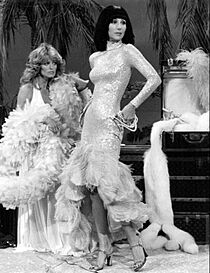
Since Sonny's first attempts at reviving their recording career as a duo had also been unsuccessful, Kapp Records recruited Snuff Garrett to work with them. He produced Cher's second US number-one single, "Gypsys, Tramps & Thieves", which "proved that ... Garrett knew more about Cher's voice and her persona as a singer than Sonny did", writes Bego. "Gypsys, Tramps & Thieves" was the first single by a solo artist to rank number one on the US Billboard Hot 100 chart at the same time as on the Canadian Singles Chart. Billboard called it "one of the 20th century's greatest songs". It was featured on the 1971 album Chér (eventually reissued under the title Gypsys, Tramps & Thieves), which was certified gold by the Recording Industry Association of America (RIAA). Its second single, "The Way of Love", reached number seven on the Billboard Hot 100 chart and established Cher's more confident image as a recording artist.
In 1972, Cher released the all-ballad set Foxy Lady, demonstrating the evolution of her vocal abilities, according to Bego. Following the release, Garrett quit as producer after disagreeing with Sonny about the kind of material Cher should record. At Sonny's insistence, in 1973 Cher released an album of standards called Bittersweet White Light, which was commercially unsuccessful. That year, lyricist Mary Dean brought Garrett "Half-Breed", a song about the daughter of a Cherokee mother and a white father, which she had written especially for Cher. Although Garrett did not have Cher as a client at the time, he was convinced that "it's a smash for Cher and for nobody else", so he held the song for months until he got Cher back. "Half-Breed" was featured on the album of the same name and became Cher's third US number-one single. Both the album and the single were certified gold by the RIAA.
In 1974, Cher released the song "Dark Lady" as the lead single from the namesake album. It reached the top position on the Billboard Hot 100, becoming Cher's fourth number-one single and making her the female artist with the most number-one singles in United States history at the time. Later that year, she released a Greatest Hits album that, according to Billboard magazine, proved her to be "one of the most consistent hitmakers of the past five years", as well as a "proven superstar who always sells records". Between 1971 and 1973, Sonny and Cher's recording career was revived with four albums released under Kapp Records and MCA Records: Sonny & Cher Live (1971), All I Ever Need Is You (1972), Mama Was a Rock and Roll Singer, Papa Used to Write All Her Songs (1973) and Live in Las Vegas Vol. 2 (1973). Cher later commented that her tight schedule during this period required her to record entire albums in just a few days while also touring and filming The Sonny & Cher Comedy Hour.
1974–1979: Divorce from Sonny Bono, marriage to Gregg Allman and decline in popularity

Cher and Sonny had had marital problems since late 1972, but appearances were maintained until 1974. "The public still thinks we are married," Sonny wrote in his diary at the time, "[and] that's the way it has to be." In February 1974, Sonny filed for separation, citing "irreconcilable differences". A week later, Cher countered with a divorce suit and charged Sonny with "involuntary servitude", claiming that he withheld her rightful share of their earnings. The couple battled in court over finances and the custody of Chaz, which was eventually granted to Cher. Their divorce was finalized on June 26, 1975.
During the divorce proceedings, Cher had a two-year romantic relationship with record executive David Geffen, who helped free her from a restrictive business arrangement with Sonny. Under the terms of this arrangement, Cher was required to work exclusively for Cher Enterprises, a company 95% owned by Sonny and 5% by his lawyer. She was considered an employee of the company, with no control over her career and finances. Cher won the Golden Globe Award for Best Actress – Television Series Musical or Comedy for The Sonny & Cher Comedy Hour in 1974. That year, Sonny premiered a solo show, The Sonny Comedy Revue, which carried the creative team behind the Sonny and Cher show. It was canceled after 13 weeks.
In 1975, Cher signed a $2.5 million deal with Warner Bros. Records and began work on her first album with the label. According to Bego, "it was their intention that [this album] was going to make millions of fans around the world take her seriously as a rock star and not just a pop singer." Despite Cher's efforts to expand her musical range by drawing inspiration from artists such as Stevie Wonder, Elton John, James Taylor, Carly Simon, Joni Mitchell and Bob Dylan, the resulting album, Stars, was commercially and critically unsuccessful. Janet Maslin of The Village Voice wrote, "Cher is just no rock and roller ... Image, not music, is Cher Bono's main ingredient for both records and TV." Despite its initial failure, the album later gained cult status and is considered among her best work.
On February 16, 1975, Cher debuted her solo CBS show, Cher. It began as a highly rated special with guests Bette Midler, Elton John and Flip Wilson. Produced by Geffen, the show showcased Cher's music, comedy, monologues, and an extensive wardrobe—the largest for a weekly TV series. Critics praised it, with the Los Angeles Times stating, "Sonny without Cher was a disaster. Cher without Sonny, on the other hand, could be the best thing that's happened to weekly television this season." Despite high ratings, the show ended within a year, replaced by a new show reuniting her with ex-husband Sonny. Cher said, "Doing a show alone was more than I could handle."
On June 30, 1975, four days after finalizing her divorce from Sonny, Cher married rock musician Gregg Allman, co-founder of the Allman Brothers Band. They had one son, Elijah Blue, on July 10, 1976. Sonny and Cher's TV reunion, The Sonny and Cher Show, debuted on CBS in February 1976—the first show ever to star a divorced couple. It was cancelled in August 1977.
In 1976, Mego Toys released a line of Sonny & Cher dolls. The Cher doll became the year's best-selling doll, surpassing Barbie. Cher's next albums, I'd Rather Believe in You (1976) and Cherished (1977)—the latter marking a return to her earlier pop storyteller style at Warner's producers' insistence—were commercial failures. Orange Coast magazine's Keith Tuber commented that Cher's weekly TV shows may have hurt her record sales, as audiences could see and hear her without needing to buy her music.
In 1977, under the rubric "Allman and Woman", Cher and Allman recorded the duet album Two the Hard Way. The couple toured Europe to support the album, though audience reception was mixed. With a combination of Cher fans and Allman Brothers fans in attendance, fights frequently broke out at venues, prompting Cher to cancel the tour. Their relationship ended soon after the tour's cancellation, and their divorce was finalized in 1979. In 1978, Cher began a two-year live-in relationship with Kiss member Gene Simmons. She briefly returned to prime time television with the specials Cher... Special (1978)—featuring a segment in which she performs all of the roles in her version of West Side Story— and Cher... and Other Fantasies (1979).
1979–1982: Second musical comeback, from disco success to leading a rock band
In 1979, Cher legally adopted her mononym. Facing financial pressures as a single mother of two, she decided to steer her singing career toward greater commercial success. Temporarily setting aside her desire to be a rock singer, she signed with Casablanca Records and launched a comeback with the single "Take Me Home" and the album of the same name, both of which capitalized on the disco craze. The album and single became instant successes, remained bestsellers for more than half of 1979 and were certified gold by the RIAA. Although initially reluctant to embrace disco music, she changed her mind after the success, saying, "I never thought I would want to do disco ... [but] it's terrific! It's great music to dance to. I think that danceable music is what everybody wants."
Encouraged by the popularity of Take Me Home, Cher sought a return to rock with Prisoner (1979). Critics found the album's mix of rock and disco tracks inconsistent, contributing to its commercial failure. The single "Hell on Wheels", featured on the soundtrack of the film Roller Boogie, reflected Cher's personal embrace of the late 1970s roller-skating craze, which she had helped popularize. Cher collaborated with Giorgio Moroder to write "Bad Love", her final Casablanca disco track, for the film Foxes (1980).
In 1980, Cher formed the rock band Black Rose with guitarist and then-partner Les Dudek. To blend in and avoid overshadowing the group with her celebrity status, she adopted a punk-inspired look, cutting her signature long hair. Although she was the lead singer, she chose not to take top billing to present the band as equal. Despite television appearances, the band struggled to book concerts. Their album, Black Rose, received poor reviews; Cher told Rolling Stone, "[Critics] didn't attack the record, they attacked me. It was like, 'How dare Cher sing rock & roll?'" Black Rose disbanded in 1981.
During Black Rose's run, Cher was also performing a residency at Caesars Palace, Las Vegas, with two shows nightly, seven days a week, earning $300,000 weekly. Beginning in June 1979 and running until 1982, the residency evolved into Cher's first solo tour, the Take Me Home Tour, as she brought her act to various US cities, as well as Canada, Europe, South Africa and Australia. Described by The Press of Atlantic City as "the biggest cabaret act ever seen on any stage", the concert series yielded two television specials: Standing Room Only: Cher in Concert (1981) and Cher... A Celebration at Caesars (1983), the latter earning her the CableACE Award for Best Actress in a Variety Program. In 1981, Cher collaborated with Meat Loaf on the duet "Dead Ringer for Love", which peaked at number five on the UK Singles Chart and was praised by AllMusic's Donald A. Guarisco as "one of the more inspired rock duets of the 1980s". The following year, Cher released the new wave album I Paralyze, a commercial failure and her only album under Columbia Records.
1982–1987: Broadway debut, acting breakthrough and musical hiatus
With declining record sales and radio airplay, Cher shifted her focus to acting. Despite earlier aspirations, her only film credits, Good Times and Chastity, were critical and commercial failures, and Hollywood did not take her seriously as an actress. Reflecting on this period, Cher said, "I was dropped by my [label] and couldn't get a job ... [so] I went to Las Vegas", which she likened to an "elephant's graveyard" for fading stars. Despite her success performing there, she felt unfulfilled: "I was making a fortune ... but I was dying inside." In 1982, she moved to New York to study acting with Lee Strasberg at the Actors Studio, but never enrolled. She auditioned for and was cast by Robert Altman in the Broadway production Come Back to the 5 & Dime, Jimmy Dean, Jimmy Dean, playing a James Dean fan club member at a 20-year reunion. That year, Altman cast her again in the film adaptation of the same title.
Director Mike Nichols, who had seen Cher onstage in Jimmy Dean, offered her the part of Dolly Pelliker, Meryl Streep's lesbian roommate in the film Silkwood. When it premiered in 1983, audiences questioned Cher's ability as an actress. She recalls attending a film preview during which the audience laughed when they saw her name in the credits. For her performance, Cher was nominated for the Academy Award for Best Supporting Actress and won the Golden Globe Award for Best Supporting Actress – Motion Picture.
Cher's next film, Mask (1985), reached number two at the box office and was Cher's first critical and commercial success as a leading actress. She won the Cannes Film Festival Award for Best Actress. During the making of the film, however, she clashed with director Peter Bogdanovich and was ultimately omitted from the Oscar nomination list. She attended the 58th Academy Awards in a tarantula-like costume, later deemed by Vanity Fair's Esther Zuckerman as Cher's "Oscar revenge dress". "As you can see, I did receive my Academy booklet on how to dress like a serious actress," Cher declared before presenting the nominees for Best Supporting Actor. The incident garnered her much publicity.
Cher's May 1986 guest appearance on talk show Late Night with David Letterman attracted much media coverage. She returned to the show in 1987, reuniting with Sonny for the last time before his death to sing an impromptu version of "I Got You Babe". According to Rolling Stone's Andy Greene, "they weren't exactly the best of friends at this point, but both of them knew it would make for unforgettable television. Had YouTube existed back then, this would have gone insanely viral the next morning."
1987–1992: Hollywood stardom and third musical comeback
Cher starred in three films in 1987. In Suspect, she portrayed a public defender aided and romanced by a juror (Dennis Quaid) in a homicide case. In George Miller's comedy horror The Witches of Eastwick, she was one of three small-town divorcees, alongside Michelle Pfeiffer and Susan Sarandon, who become involved with a mysterious and wealthy visitor (Jack Nicholson). In Norman Jewison's romantic comedy Moonstruck, she played an Italian widow who falls for her fiancé's younger brother (Nicolas Cage). The latter two films ranked among 1987's top ten highest-grossing movies.
The New York Times' Janet Maslin wrote Moonstruck "offers further proof that Cher has evolved into the kind of larger-than-life movie star who's worth watching whatever she does." For that film, Cher won the Academy Award for Best Actress and the Golden Globe Award for Best Actress in a Motion Picture – Musical or Comedy. By 1988, Cher had become one of the most bankable actresses of the decade, commanding $1 million per film. That year, she released the fragrance Uninhibited, which earned about $15 million in its first year sales.
In 1987, Cher signed with Geffen Records and revived her musical career with what music critics Johnny Danza and Dean Ferguson describe as "her most impressive string of hits to date", establishing her as a "serious rock and roller ... a crown that she'd worked long and hard to capture". Michael Bolton, Jon Bon Jovi, Desmond Child and Richie Sambora produced her first Geffen album, Cher. Despite facing strong retail and radio airplay resistance upon its release, the album proved to be a commercial success, certified platinum by the RIAA. Cher features the rock ballad "I Found Someone", Cher's first US top-ten single in more than eight years.
Cher had romantic relationships with actors Val Kilmer, Eric Stoltz and Tom Cruise, hockey player Ron Duguay, film producer Josh Donen, Bon Jovi guitarist Richie Sambora and bagel baker Rob Camilletti .
Cher's 19th studio album Heart of Stone (1989) was certified triple platinum by the RIAA. Its second single, "If I Could Turn Back Time" topped the Australian charts for seven weeks, reached number three on the Billboard Hot 100 chart and became one of Cher's most successful singles. Other US top-ten singles from the album were "After All", a duet with Peter Cetera and "Just Like Jesse James". Cher won the Favorite All-Around Female Star Award at the 1989 People's Choice Awards and launched the Heart of Stone Tour the same year. Critics praised the tour's nostalgia and Cher's showmanship. A television special, Cher... at the Mirage (1991), was filmed during a Las Vegas concert.
In Mermaids (1990), her first film in three years, Cher drew inspiration from her mother to portray a woman who moves her daughters (Winona Ryder, Christina Ricci) from town to town after failed relationships. She clashed with the film's first two directors, Lasse Hallström and Frank Oz, who were replaced by Richard Benjamin. Producers, seeing Cher as the star attraction, granted her creative control. The film was a box office success and received positive reviews. One of the two songs Cher recorded for the film's soundtrack, a cover of Betty Everett's "The Shoop Shoop Song (It's in His Kiss)", topped the UK Singles Chart for five weeks.
Cher's final studio album with Geffen Records, Love Hurts (1991), spent six weeks at number one in the UK and produced the UK top-ten single "Love and Understanding". The album was certified gold by the RIAA. In later years, Cher commented that her Geffen label "hit years" had been especially significant to her, "because I was getting to do songs that I really loved ... songs that really represented me and they were popular!" In 1991, she published the exercise book Forever Fit, followed by the fitness videos CherFitness: A New Attitude and CherFitness: Body Confidence in 1992. That same year, she embarked on the Love Hurts Tour and released the UK-only compilation album Greatest Hits: 1965–1992, which topped the UK Albums Chart for seven weeks.
1992–1998: From A-list actress to infomercial queen, death of Sonny Bono
According to Berman, the unexpected acclaim for Moonstruck (1987) made Cher "overly cautious" about future roles, mindful of the high expectations. Partly due to her difficult experience filming Mermaids, she turned down leading roles in Thelma & Louise and The War of the Roses. In the early 1990s, she contracted the Epstein–Barr virus and developed chronic fatigue syndrome, leaving her too exhausted for music or film projects. To earn money, she appeared in infomercials for health, beauty and diet products, earning nearly $10 million. These skits were parodied on Saturday Night Live and critics viewed them as a sellout, speculating her film career was over. The 1995 film Clueless references this period, with protagonist Cher Horowitz joking she was named after a "great [singer] of the past who now does infomercials". Cher later remarked, "Suddenly I became the Infomercial Queen ... people stripped me of all my other things."
Cher made cameo appearances in the Robert Altman films The Player (1992) and Prêt-à-Porter (1994). In 1994, she launched a Gothic-themed mail-order catalog, Sanctuary, and contributed a rock version of "I Got You Babe" to MTV's animated sitcom Beavis and Butt-Head. In 1995, she topped the UK Singles Chart with the charity single "Love Can Build a Bridge", alongside Chrissie Hynde, Neneh Cherry and Eric Clapton. That year, she signed with Warner Music UK's WEA label and released It's a Man's World (1995), an album of songs originally performed by men. Critics praised its R&B influences and Cher's vocal growth, with Stephen Holden of The New York Times calling it a "soulful collection of grown-up pop songs" and the highlight of her recording career. The album features "Walking in Memphis", certified silver by the British Phonographic Industry (BPI), and the UK top-ten single "One by One". It reached number 10 on the UK Albums Chart. A remixed US version, shifting from rock to a more radio-friendly sound, was less successful, peaking at number 64 on the Billboard 200.
In 1996, Cher starred alongside Demi Moore and Sissy Spacek in If These Walls Could Talk (1996), a three-part anthology television film. It became the highest-rated original HBO movie to date, attracting 6.9 million viewers. That same year, Cher appeared in Paul Mazursky's dark comedy Faithful. While the film received negative reviews, Cher was praised for her role. Her music played a large role in the American TV series The X-Files episode "The Post-Modern Prometheus" (1997). Written with her in mind, it tells the story of a scientist's grotesque creature who idolizes Cher because of her role in Mask, where her character cares for her disfigured son.
Following Sonny Bono's death in a skiing accident in 1998, Cher delivered a tearful eulogy at his funeral, calling him "the most unforgettable character" she had met. She paid tribute to him by hosting the CBS special Sonny & Me: Cher Remembers, which aired on May 20, 1998. That month, Sonny and Cher received a star on the Hollywood Walk of Fame for Television. Later that year, Cher published The First Time, a collection of autobiographical essays of "first-time" events in her life, which critics praised as down-to-earth and genuine. Although the manuscript was almost finished when Sonny died, she could not decide whether to include his death in the book; she feared being criticized for capitalizing on the event. She told Rolling Stone, "I couldn't ignore it, could I? I might have if I cared more about what people think than what I know is right for me."
1998–2002: Fourth musical comeback and songwriting debut
Cher's 22nd studio album, Believe (1998), marked a departure from her previous rock sound to 1970s disco-inspired dance-pop. It sold 10 million copies worldwide, achieving quadruple platinum status in the US and gold or platinum certifications in 39 countries. Entertainment Weekly described the album as "the most dramatic comeback Hollywood has seen since ... the last time Cher raised her career from the dead", emphasizing its role in introducing her to a new generation of fans who "hadn't yet been born when 'I Got You Babe' ruled the charts in 1965."
Believe's title track reached number one in 23 countries and sold over 10 million copies globally. It was the best-selling single of 1998 in the UK and of 1999 in the US. "Believe" debuted at number one in the UK, held the position for seven weeks and became the UK's best-selling single by a female artist. In the US, it topped the Billboard Hot 100 for four weeks, making Cher, at 52, the oldest female artist to top the chart. "Believe" earned Cher the Grammy Award for Best Dance Recording and the 1999 Billboard Music Award for Hot 100 Single of the Year. Rolling Stone listed it among "The 500 Greatest Songs of All Time" in 2021.
On January 31, 1999, Cher sang "The Star-Spangled Banner", the US national anthem, at the Super Bowl XXXIII. She co-headlined the television special VH1 Divas Live '99, which drew 19.4 million viewers, becoming the highest-rated program in VH1's history at the time. Her Do You Believe? Tour (1999–2000) sold out in every American city it visited, drawing a global audience of over 1.5 million. Its companion television special, Cher: Live in Concert – From the MGM Grand in Las Vegas (1999), achieved a 13.0 rating, making it HBO's highest-rated original program of 1998–1999.
Billboard named Cher the top dance artist of 1999. Her former label, Geffen, capitalized on her success with the US-only compilation If I Could Turn Back Time: Cher's Greatest Hits (1999), certified gold by the RIAA, while Cher oversaw The Greatest Hits (1999) for international markets, selling three million copies outside the US by January 2000. Cher starred in Franco Zeffirelli's critically acclaimed war film Tea with Mussolini (1999), earning praise for her portrayal of a flamboyant American socialite unwelcome among Englishwomen in Italy. Film Comment remarked, "She manages the movie star trick of being at once a character and at the same time never allowing you to forget: that's Cher", adding that her performance proved "how sorely she's been missed from movie screens."
In 2000, Cher released Not Commercial, an album she wrote after attending a songwriting conference in 1994; it marked her first attempt at writing most of the tracks for an album. Rejected by her label for being uncommercial, she sold it exclusively on her website. The song "Sisters of Mercy", which criticizes as "cruel, heartless and wicked" the nuns who had prevented her mother from retrieving her from a Catholic orphanage, drew condemnation from the Catholic Church. Her dance-focused follow-up to Believe, Living Proof (2001), debuted at number nine on the Billboard 200 and was certified gold by the RIAA. It features the UK top-ten single "The Music's No Good Without You" and "Song for the Lonely", a tribute to "the courageous people of New York" following the September 11 attacks. Named Billboard's top dance artist of 2002, Cher received the Artist Achievement Award from Steven Tyler at the 2002 Billboard Music Awards for having "helped redefine popular music with massive success on the Billboard charts." That year, her wealth was estimated at $600 million.
2002–2018: Farewell tours, concert residencies and return to acting and recording
In June 2002, Cher launched the Living Proof: The Farewell Tour, promoted as her final concert tour, though she planned to keep recording and acting. Jon Pareles of The New York Times praised it as a celebration of Cher's resilience, highlighting her ability to "triumph over restraint, aging and gravity" and calling her "a hit machine immune to sagging flesh". Initially set for 49 shows, the tour was repeatedly extended. By October 2003, it had become the most successful tour by a female artist, grossing $145 million from 200 shows with 2.2 million attendees. The NBC special Cher: The Farewell Tour drew 17 million viewers, becoming the highest-rated network concert special of 2003 and earning Cher the Primetime Emmy Award for Outstanding Variety Special (Pre-Recorded).
After leaving Warner UK in 2002, Cher signed a global deal with Warner Bros. Records in September 2003. Forbes named her the highest-paid female musician of 2003, earning $33.1 million. The compilation album The Very Best of Cher (2003) peaked at number four on the Billboard 200 and was certified double platinum by the RIAA. In the Farrelly brothers' comedy Stuck on You (2003), Cher played a satirical version of herself. Cher's Farewell Tour concluded in April 2005 after 325 shows, drawing over 3.5 million attendees and grossing $250 million, ranking among the top-ten highest-grossing tours of the 2000s.
After three years of retirement, Cher began a three-year, 200-show residency in 2008 at the Colosseum at Caesars Palace, Las Vegas, earning a reported $60 million. Titled Cher, the production featured advanced stage effects and over 20 costume changes. In Burlesque (2010), her first musical film since Good Times (1967), she played a nightclub owner mentoring a Hollywood hopeful (Christina Aguilera). Her song "You Haven't Seen the Last of Me", from the film's soundtrack, topped the Billboard Dance Club Songs chart in January 2011, making Cher the only artist with Billboard number-one singles in six consecutive decades (1960s–2010s).
In 2011, Cher lent her voice to Janet the Lioness in the comedy Zookeeper. Dear Mom, Love Cher, a documentary she produced about her mother Georgia Holt, aired on Lifetime in May 2013. Closer to the Truth (2013), Cher's 25th studio album and the first since 2001's Living Proof, entered the Billboard 200 at number three, her highest position on that chart to date. The Boston Globe's Michael Andor Brodeur commented that "Cher's 'Goddess of Pop' sash remains in little danger of undue snatching; at 67, she sounds more convincing than J-Lo or Madonna reporting from 'the club'". Cher premiered the lead single "Woman's World" on the season four finale of the talent show The Voice, her first live TV performance in over a decade. She later joined the show's season five as judge Blake Shelton's team adviser.
In June 2013, Cher headlined the annual Dance on the Pier benefit, celebrating LGBTQ Pride Day, achieving the event's first full-capacity crowd in five years. She embarked on the Dressed to Kill Tour in March 2014, nearly a decade after announcing her "farewell tour", joking during shows that this would actually be her last farewell tour while crossing fingers. The tour's first leg, comprising 49 sold-out shows in North America, grossed $54.9 million. Later that year, she canceled all remaining dates due to a kidney infection. Cher collaborated with American hip hop group Wu-Tang Clan on their 2015 album Once Upon a Time in Shaolin, credited under her 1964 alias, Bonnie Jo Mason. The album, produced as a single copy and sold via online auction, became the most expensive album ever sold.
After attending the 2015 Met Gala as Marc Jacobs's guest, Cher became the face of his Fall/Winter campaign. In February 2017, she launched Classic Cher, a three-year concert residency at the Park Theater in Las Vegas and The Theater at MGM National Harbor in Washington, D.C. At the 2017 Billboard Music Awards, Cher performed "Believe" and "If I Could Turn Back Time", her first awards show performance in over 15 years. Gwen Stefani presented Cher with the Billboard Icon Award, calling her the "definition of the word Icon" and a role model of strength and authenticity. In March 2018, Cher headlined the 40th Sydney Gay and Lesbian Mardi Gras, with tickets selling out in three hours after she hinted at her involvement on Twitter.
Cher returned to film after nearly a decade in Mamma Mia! Here We Go Again (2018), a jukebox musical romantic comedy based on the songs of ABBA. The film serves as both a prequel and a sequel to the 2008 film Mamma Mia! and features Cher as Ruby Sheridan, the mother of Donna (Meryl Streep) and grandmother of Sophie (Amanda Seyfried). Critics praised Cher's performance as a highlight of the movie, with New York magazine commenting, "Every single movie—no matter how flawless—would be infinitely better if it included Cher." For the film's soundtrack, she recorded two ABBA songs, "Fernando" and "Super Trouper". Björn Ulvaeus of ABBA stated, "She makes 'Fernando' her own. It's her song now."
While promoting Mamma Mia! Here We Go Again, Cher announced she was working on an album of ABBA covers. Released in September 2018, Dancing Queen debuted at number three on the Billboard 200, tying with 2013's Closer to the Truth as Cher's highest-charting solo album in the US. With first-week sales of 153,000 units, it achieved the year's biggest sales week for a pop album by a female artist and marked Cher's largest sales week since 1991. The album also topped Billboard's Top Album Sales chart. Dancing Queen received widespread critical acclaim; Rolling Stone commented that Cher makes the ABBA songs sound as if they were written for her, while Entertainment Weekly praised it as her "most significant release since 1998's Believe."
Cher embarked on the Here We Go Again Tour in 2018, which continued until 2020, when it was indefinitely postponed due to the COVID-19 pandemic lockdowns. The Cher Show, a biographical jukebox musical based on Cher's life and music, premiered in Chicago in June 2018. Featuring three actresses portraying Cher at different stages of her life, it ran on Broadway from December 2018 to August 2019. Subsequent productions toured the UK, Ireland and the US. On December 2, 2018, Cher received the Kennedy Center Honor in recognition of her "extraordinary contributions to culture", with tribute performances of her songs by Adam Lambert, Cyndi Lauper and Little Big Town. The following year, Cher launched Cher Eau de Couture, her second fragrance, which she described as a "genderless" follow-up to 1987's Uninhibited.
During the COVID-19 pandemic in 2020, Cher focused on projects that could be completed from home. In May 2020, she released her first Spanish-language song, a cover of ABBA's "Chiquitita", with proceeds donated to UNICEF. Later that year, she joined the charity supergroup BBC Radio 2 Allstars for a cover of Oasis's "Stop Crying Your Heart Out". The recording, made in support of the Children in Need charity, became a UK top-ten single. Cher voiced a bobblehead version of herself in the animated film Bobbleheads: The Movie (2020). She was featured in The New York Times Magazine's annual "Best Actors" list for 2020, becoming the first actor included without appearing in a theatrical release that year; her performance in Moonstruck (1987) was praised as "radiant" and a source of comfort during quarantine.
In the early 2020s, Cher collaborated with major fashion brands. She starred in Dsquared2's Spring/Summer 2020 campaign, MAC Cosmetics' "Challenge Accepted" campaign in January 2022 and UGG's "Feel" campaign the same month. For Pride Month in June 2022, Cher partnered with Versace to launch the "Chersace" capsule collection, with proceeds benefiting the LGBTQIA+ charity Gender Spectrum. In September 2022, she walked the runway at Paris Fashion Week, closing Balmain's Spring/Summer 2023 show, and in November, she starred in the brand's "Balmain Blaze" campaign. That month, Cher began dating music executive Alexander Edwards, 40 years her junior. Their age gap sparked criticism online, which she addressed by tweeting, "Love doesn't know math."
2023–present: Christmas, Rock and Roll Hall of Fame induction and memoirs
Cher's first holiday album, Christmas (2023), features duets with Stevie Wonder, Darlene Love, Michael Bublé, Tyga and Cyndi Lauper. Its lead single, "DJ Play a Christmas Song", topped the Billboard Adult Contemporary and Dance/Electronic Digital Song Sales charts in December 2023, extending Cher's record as the only solo artist with Billboard number-one singles in seven consecutive decades (1960s–2020s).
In December 2023, Cher criticized the Rock and Roll Hall of Fame for excluding her since becoming eligible in 1990, saying, "I wouldn't be in it now if they gave me a million dollars," and suggesting the institution "can just you-know-what themselves." Two months later, she received her first nomination and was inducted on October 19, 2024, becoming the first musician-actor to win an Academy Award for acting and join the Hall of Fame. Cher decided to accept the honor out of admiration for her fellow inductees. At the ceremony, she performed "If I Could Turn Back Time" and "Believe", the latter as a duet with Dua Lipa.
In November 2024, Cher published Cher: The Memoir, Part One, the first of a two-part autobiography covering her childhood, early career and marriages to Sonny Bono and Gregg Allman. Written over seven years, it debuted at number one on The New York Times Best Seller list, holding the position for three weeks. The second part is set for release in 2025. To celebrate 60 years in music, Cher released the greatest hits album Forever (2024), available as a 21-track standard edition and a 40-track digital edition, Forever Fan, featuring Sonny & Cher songs and lesser-known tracks curated by Cher. Rolling Stone noted the absence of "Half-Breed", her third Billboard Hot 100 number-one, linking it to a trend of artists reevaluating their catalogs in light of changing cultural sensitivities.
Artistry
Music and voice
Cher has explored diverse musical styles, including rock (folk, punk, arena and pop subgenres), soul, jazz, disco, new wave, power ballads, hip hop and electronic dance music, aiming to "remain relevant and do work that strikes a chord". Music historian Annie Zaleski wrote in Cher's Rock and Roll Hall of Fame induction essay that she sings "nearly every style of music" effortlessly. Cher's music often centers on heartbreak, independence and women's empowerment, making her a "brokenhearted symbol of a strong but decidedly single woman", according to Out magazine's Judy Wieder. Goldmine's Phill Marder credits Cher's musical success to her "nearly flawless" song selection, noting that while Sonny Bono contributed to early hits, most of her solo successes came from independent songwriters she chose. Her 2000 album Not Commercial, largely self-written, has a "1970s singer-songwriter feel" that highlights her storytelling skills, according to AllMusic's Jose F. Promis.
Robert Hilburn of the Los Angeles Times writes, "There were a lot of great records by female singers in the early days of rock ... None, however, reflected the authority and command that we associate with rock 'n' roll today as much as [Cher's] key early hits". Some of Cher's early songs discuss subjects rarely addressed in American popular music such as divorce and racism.
Cher's contralto voice has been widely praised for its distinctiveness. Ann Powers of The New York Times described it as "a quintessential rock voice: impure, quirky [and] a fine vehicle for projecting personality." Zaleski called her timbre "recognizable, dusky and sultry, like exquisite black velvet," with a wide range and "warbling" vibrato. AllMusic's Bruce Eder stated that her voice's "intensity and passion" are amplified by her acting skills, creating "an incredibly powerful experience for the listener." The Guardian's Laura Snapes called her voice "miraculous", capable of expressing "vulnerability, vengeance and pain" simultaneously. Zaleski added that her vocal delivery feels like "a direct line to her soul", while author Paul Simpson observed that "she spits out the words ... with such conviction you'd think she was delivering an eternal truth about the human condition".
Cher's 1998 song "Believe" was the first commercial recording to use Auto-Tune—an audio processor for correcting off-key vocals—as a stylistic effect, creating a robotic, futuristic sound. Cher, who proposed the effect, faced resistance from her label but insisted it remain, saying, "You can change [the song] over my dead body". Dubbed the "Cher effect", the technique was later described by Pitchfork's Simon Reynolds as having "revolutionized the sound of popular music" and as "the sound of the 21st century." Cher used Auto-Tune extensively on Living Proof (2001) and subsequent albums. In 2023, the Cher Fan Club's YouTube channel released a cover of Madonna's "La Isla Bonita" using artificial intelligence (AI) to replicate Cher's voice. Calling it "shocking", Cher expressed concern: "I've spent my entire life trying to be myself and now ... they'll do my singing? ... it's out of control."
Films, videos and stage
Maclean's magazine's Barbara Wickens wrote, "Cher has emerged as probably the most fascinating movie star of her generation ... [because] she has managed to be at once boldly shocking and ultimately enigmatic." New York Post movie critic David Edelstein attributes Cher's "top-ranking star quality" to her ability of projecting "honesty, rawness and emotionality. She wears her vulnerability on her sleeve."
Author Yvonne Tasker notes that Cher's film roles often mirror her public image as a rebellious and self-made woman. In her films, she recurrently serves as a social intermediary to disenfranchised male characters. Film critic Kathleen Rowe wrote of Moonstruck that the depiction of Cher's character as "a 'woman on top' [is] enhanced by the unruly star persona Cher brings to the part'". For Moonstruck, Cher was ranked 1st on Billboard's list of "The 100 Best Acting Performances by Musicians in Movies" and her performance was described as "the standard by which you mentally check all others". Moonstruck was acknowledged by the American Film Institute as the eighth best romantic comedy film of all time.
Cher's public image is also reflected in her music videos and live performances, where she explores themes of self-construction, perfection, according to Tasker. Inspired by Cher's Farewell Tour, singer Pink began studying aerial silks, which became central to her performances. James Sullivan of the San Francisco Chronicle highlighted Cher's impact on the era of stadium-sized shows, stating, "She's comfortable enough to see such imitation as flattery, not theft."
Cher was ranked 17th on VH1's list of the "50 Greatest Women of the Video Era". The 1980 video for "Hell on Wheels" involves cinematic techniques and was one of the first music videos ever.
Activism
Philanthropy
Cher's philanthropic work is channeled through the Cher Charitable Foundation, which focuses on combating poverty, advancing medical research, improving health care and supporting the rights of vulnerable groups such as veterans, children, LGBTQ individuals, elders and animals.
Cher has been a vocal advocate for American soldiers, returning veterans and communities affected by war. In 1993, she joined a humanitarian mission to Armenia, delivering food and medical supplies to the war-torn region. She has supported Operation Helmet, which provides free helmet upgrade kits to troops in Iraq and Afghanistan, and contributed to the Intrepid Fallen Heroes Fund, aiding military personnel severely injured in war-related operations.
Beginning in 1990, Cher served as a donor and as the National Chairperson and Honorary Spokesperson for the Children's Craniofacial Association, whose mission is to "empower and give hope to facially disfigured children and their families". The annual Cher's Family Retreat is held each June to provide craniofacial patients and their families an opportunity to interact with others with similar experiences. She supports the Get A-Head Charitable Trust, which aims to improve the quality of life for people with head and neck diseases.
Cher is a donor, fundraiser and international spokesperson for Keep a Child Alive, which seeks to combat AIDS, including providing antiretroviral medicine to children and their families. In 1996, she hosted the American Foundation for AIDS Research (amfAR) Benefit alongside Elizabeth Taylor at the Cannes Film Festival. In 2015, she received the amfAR Award of Inspiration for "her willingness and ability to use her fame for the greater good" and for being "one of the great champions in the fight against AIDS".
Cher has served as the Honorary National Chair of Habitat for Humanity's "Raise the Roof" fundraising initiative, aimed at supporting the construction and repair of affordable homes for families in need. In 2007, Cher became the primary supporter of the Peace Village School (PVS) in Ukunda, Kenya, which "provides nutritious food, medical care, education and extracurricular activities for more than 300 orphans and vulnerable children." Her support enabled the school to acquire land and build permanent housing and school facilities and in partnership with Malaria No More and other organizations, she piloted an effort to eliminate malaria mortality and morbidity for the children, their caregivers and the surrounding community.
In 2016, after the discovery of lead contamination in the drinking water of Flint, Michigan, Cher donated more than 180,000 bottles of water to the city. During the COVID-19 pandemic, Cher launched the CherCares Pandemic Resource and Response Initiative (CCPRRI) alongside Dr. Irwin Redlener, the head of Columbia University's Pandemic Resource and Response Center, to distribute $1 million to "chronically neglected and forgotten people" through the Entertainment Industry Foundation (EIF). Cher told Billboard, "There are rural areas where people of color and Latinos and Native Americans were getting no services. It's not a lot of money—$1 million goes in the blink of an eyelash!—so now I'm trying to get my friends to make it a lot more so we can do something that will really meet people's needs."
In 2017, Cher weighed in on the need to protect elder rights as she executive produced Edith+Eddie, a documentary about a nonagenarian interracial couple, which was nominated for the Academy Award for Best Documentary (Short Subject). That same year, she co-founded Free the Wild, an international charity dedicated to protecting wild animals in captivity. In 2020, Free the Wild partnered with Four Paws International, prompting Cher to travel to Pakistan to advocate for and work with the country's government for the transfer of Kaavan, an elephant confined to a zoo for 35 years, to a wildlife sanctuary in Cambodia. This effort was chronicled in the documentary Cher & the Loneliest Elephant, released on Paramount+ in 2021, which detailed her collaboration with animal aid groups and veterinarians to free Kaavan.
Cher's older child, Chaz Bono, first came out as a lesbian at age 17, which reportedly caused Cher to feel "guilt, fear and pain". However, she soon came to accept the fact and came to the conclusion that LGBTQ people "didn't have the same rights as everyone else, [and she] thought that was unfair". She was the keynote speaker for the 1997 national Parents, Families, & Friends of Lesbians and Gays (PFLAG) convention and has since become one of the LGBTQ community's most vocal advocates. In May 1998, she received the GLAAD Vanguard Award for having "made a significant difference in promoting equal rights for lesbians and gay men". On June 11, 2009, Chaz came out as a transgender man.
Politics
Cher has said that she is not a registered Democrat, but has attended many Democratic events. Her progressive political views have attracted media attention and she has been an outspoken critic of the conservative movement. She has commented that she did not understand why anyone would be a Republican because eight years under the administration of George W. Bush "almost killed [her]".
During the 2000 United States presidential election, ABC News wrote that she was determined to do "whatever possible to keep him [Bush] out of office". She told the site, "If you're black in this country, if you're a woman in this country, if you are any minority in this country at all, what could possibly possess you to vote Republican? ... You won't have one ... right left." She added, "I don't like Bush. I don't trust him. I don't like his record. He's stupid. He's lazy."
On October 27, 2003, Cher anonymously called a C-SPAN phone-in program to recount a visit she made to maimed soldiers at the Walter Reed Army Medical Center and criticized the lack of media coverage and government attention given to injured servicemen. Although she identified herself as an unnamed entertainer, she was recognized by the C-SPAN host, who subsequently questioned her about her 1992 support for independent presidential candidate Ross Perot. She said:
When I heard him talk right in the beginning, I thought that he would bring some sort of common-sense business approach and also less partisanship, but then ... I was completely disappointed like everyone else when he just kind of cut and run and no one knew exactly why ... Maybe he couldn't have withstood all the investigation that goes on now.
In a 2006 Stars and Stripes interview, Cher elaborated on her "against the war in Iraq but for the troops" position: "I don't have to be for this war to support the troops because these men and women do what ... they're told to do ... They do the best they can. They don't ask for anything."
Cher supported Hillary Clinton in her 2008 presidential campaign. After Obama won the Democratic nomination, she supported his candidacy. However, in a 2010 interview with Vanity Fair, she commented that she "still thinks Hillary would have done a better job", although she "accepts the fact that Barack Obama inherited insurmountable problems".
In September 2013, Cher declined an invitation to perform at the 2014 Winter Olympics opening ceremony in Russia due to the country's controversial anti-LGBTQ legislation that overshadowed preparations for the event. In June 2015, after Donald Trump announced his candidacy for president, she made critical comments on Twitter, stating that "Donald Trump's punishment is being Donald Trump". In 2018, after the victory in Brazil's presidential election of right-wing populist Jair Bolsonaro, Cher called him a "pig" and "a politician from hell", before declaring that Bolsonaro should be "locked in prison for the rest of his life".
Cher has advocated for awareness of the Armenian Genocide. At the 2016 premiere of The Promise, a war film depicting the genocide, she criticized Turkey's refusal to recognize the events as genocide and highlighted the general public's lack of awareness. She referenced the Obersalzberg Speech and the line, "Who, after all, speaks today of the annihilation of the Armenians?" She also discussed her Armenian heritage and her grandparents' survival of the genocide. In 2021, she congratulated Joe Biden on Twitter for being the first US President to formally acknowledge the Armenian Genocide.
In September 2020, Cher raised nearly $2 million for Biden's presidential campaign at a virtual, LGBTQ-themed fundraiser. In October, she traveled to Nevada and Arizona to campaign on behalf of Biden, and released a cover version of "Happiness is Just a Thing Called Joe", a song conceived for the 1943 musical film Cabin in the Sky, with lyrics updated to be about Biden. The same month, Cher posted messages on Twitter in support of Armenia and Artsakh regarding the Nagorno-Karabakh war.
In 2022, following the Russian invasion of Ukraine, Cher expressed her support for Ukraine and called for aid to Ukrainians through her Twitter account. She referred to Russian President Vladimir Putin as a despot intent on restoring the Soviet Union, and announced plans to provide shelter for Ukrainian refugees in her home.
Legacy
Rolling Stone's Rob Sheffield stated how "there are no other careers remotely like hers, [particularly] in the history of pop music" and referred to Cher as "the one-woman embodiment of the whole gaudy story of pop music." According to Goldmine magazine's Phill Marder, Cher "has been and remains today one of the Rock Era's most dominant figures". He described her as the leader of an effort in the 1960s to "advance feminine rebellion in the rock world [and] the prototype of the female rock star, setting the standard for appearance, from her early hippie days to her later outlandish outfits, and her attitude—the perfect female punk long before punk even was a rock term."
Billboard's Keith Caulfield wrote that "there's divas, and then there's Cher." The New York Times' Matthew Schneier stated, "[Cher] has earned her mononym. Her star power is such that she has spored an entire industry of imitators, both figurative and literal." Dazed magazine's Shon Faye elaborates: "If Madonna and Lady Gaga and Kylie and Cyndi Lauper were playing football, Cher would be the stadium they played on, and the sun that shone down on them." According to Jeff Miers from The Buffalo News, "Her music has changed with the times over the decades, rather than changing those times through groundbreaking work"; however, he felt that subsequent female pop singers were heavily inspired by Cher's abilities to combine "showmanship with deep musicality ... to make valid statements in a wide variety of trend-driven idioms ... to ease effortlessly between pop subgenres [and] to shock without alienating her fans", as well as by her charismatic stage presence and the strong LGBT support among her fan base.
Cher is commonly referred to by the media as the "Goddess of Pop". Her work in music, film, television, and fashion has influenced artists including Benjamin Francis Leftwich, Betsy, Beyoncé, Bonnie McKee, Britney Spears, Bruno Mars, Christina Aguilera, Cleo, Cyndi Lauper, Drew Barrymore, Dua Lipa, Gemma Chan, Gwen Stefani, Helena Vondráčková, Jennifer Lopez, Kacey Musgraves, Kanye West, Katy Perry, Lady Gaga, Lil' Kim, Lizzo, Lucy Dacus, Miley Cyrus, Olivier Rousteing, Paulina Rubio, Pink, Post Malone, Madonna, Marc Jacobs, Ralph, Rihanna, Rita Ora, Rob Halford of Judas Priest, RuPaul, Sarah Paulson, Saweetie, Shania Twain, Shirley Manson of Garbage, Sofia Carson, Taylor Swift, Tina Turner, Tracy Chapman, Troye Sivan, and Zendaya.
Cher has repeatedly reinvented herself through various personas, for which Professor Richard Aquila from Ball State University called her "the ultimate pop chameleon". According to Entertainment Weekly's Marc Snetiker, "Cher has floated through generation after generation, scooping up new fans, thrilling old ones, reinventing her own myth and glittering splendidly through it all." Billboard magazine's Brooke Mazurek credited Cher as having "revolutionized the idea of what a pop star could visually accomplish, the way they could create multiple personas that live on and off-stage." James Reed from The Boston Globe elaborates: "Along with David Bowie, she is one of the original chameleons in pop music, constantly in flux and challenging our perceptions of her[.]" The New York Times declared Cher as the "Queen of the Comeback". According to author Lucy O'Brien, "Cher adheres to the American Dream of reinvention of self: 'Getting old does not have to mean getting obsolete.'"
Author Craig Crawford, in his book The Politics of Life: 25 Rules for Survival in a Brutal and Manipulative World (2007), describes Cher as "a model of flexible career management", and relates her career successes to a constant reshaping of her image according to the evolving trends of popular culture. He further explains that she billed "each dramatic turnaround of style as another example of rebellion—an image that allowed her to make calculated changes while appearing to be consistent." Author Grant McCracken stated, "The term 'reinvention' is now often used to talk about the careers of American celebrities. But in Cher's case, it is particularly apt [because she] is inclined to lock on to each new fashion wave [and] is swept violently down the diffusion stream and out of fashion. Only substantial re-creation permits her to return to stardom." Her "integrity" and "perseverance" are highlighted in the Reaching Your Goals book series of illustrated inspirational stories for children, in which her life is detailed emphasizing the importance of self-actualization: "For years, Cher worked hard to become a successful singer. Then she worked hard to become an actress. Even when she needed money, she turned down movie roles that weren't right for her. Her goal has always been to be a good actress, not just a rich and famous one."
Cher's "ability to forge an immensely successful and lengthy career as a woman in a male-dominated entertainment world" has drawn attention from feminist critics. She was featured in the 16th-anniversary edition of Ms. magazine as an "authentic feminist hero" and a 1980s role model for women.
Stephanie Brush from The New York Times wrote, following the telecast of Cher's Oscar win in 1988, that she "performs the function for women moviegoers that Jack Nicholson has always fulfilled for men.
Alec Mapa of The Advocate elaborates: "While the rest of us were sleeping, Cher's been out there for the last four decades living out every single one of our childhood fantasies ... Cher embodies an unapologetic freedom and fearlessness that some of us can only aspire to." Alexander Fury of The Independent wrote that Cher "represents a seemingly immortal, omnipotent, uni-monikered level of fame." Bego stated: "No one in the history of show business has had a career of the magnitude and scope of Cher's. She has been a teenage pop star, a television hostess, a fashion magazine model, a rock star, a pop singer, a Broadway actress, an Academy Award-winning movie star, a disco sensation, and the subject of a mountain of press coverage." Lynch wrote that "the world would certainly be different if she hadn't stayed so irrevocably Cher from the start."
Achievements
As a solo artist, Cher has sold 100 million records worldwide, making her one of the best-selling music artists of all time. She is one of the few artists to win three of the four major American entertainment awards (EGOT—Emmy, Grammy, Oscar and Tony), and one of five actor-singers to have had a US number-one single and won an acting Academy Award. Her breakthrough single, Sonny & Cher's "I Got You Babe", is a Grammy Hall of Fame inductee and was featured on Rolling Stone's "500 Greatest Songs of All Time" list in 2003. Her 1971 single "Gypsys, Tramps & Thieves" was called "one of the 20th century's greatest songs" by Billboard. Her 1998 song "Believe" is the biggest-selling single of all time by a female artist in the UK. It was voted the world's eighth favorite song in a poll conducted by BBC in 2003—the only American song on the list. "Believe" appeared on the 2021 revised list of Rolling Stone's "500 Greatest Songs of All Time". In 1988, Cher became the first performer to receive an Academy Award for acting and a RIAA-certified gold album in the same year.
Cher is the only solo artist to have a number-one single on a Billboard chart in seven consecutive decades, from the 1960s to the 2020s. She held the previous US record for Billboard Hot 100 number-one singles over the longest period of time: 33 years, seven months and three weeks between "I Got You Babe", which topped the chart for the first time on August 14, 1965, and "Believe", whose last week at number one was April 3, 1999. With "Believe", she became the oldest female artist at the time to have a US number-one song in the rock era, at the age of 52. Billboard ranked her at number 43 on their "Greatest Hot 100 Artists of All Time" list. In 2014, the magazine listed her as the 23rd highest-grossing touring act since 1990, with total earned revenue of $351.6 million and 4.5 million attendance.
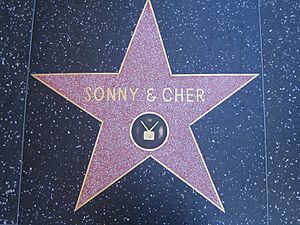
Cher received the Vanguard Award at the 1998 GLAAD Media Awards, the Legend Award at the 1999 World Music Awards, a special award for influence on fashion at the 1999 CFDA Fashion Awards, the Lucy Award for Innovation in Television at the 2000 Women in Film Awards, the Artist Achievement Award at the 2002 Billboard Music Awards, the Lifetime Achievement Award at the 2010 Glamour Awards, the Legend Award at the 2013 Attitude Awards, the Award of Inspiration at the 2015 amfAR Gala, the Icon Award at the 2017 Billboard Music Awards, the Ambassador for the Arts Award at the 2019 Chita Rivera Awards for Dance and Choreography, and the 2020 Spirit of Katharine Hepburn Award. In 2010, Cher received the honor of placing her handprints and footprints in cement in front of Grauman's Chinese Theatre in Hollywood. Her name is on a star on the Hollywood Walk of Fame as part of the duo Sonny & Cher. She had also been selected for the honor as a solo artist in 1983, but declined to schedule the mandatory personal appearance. In 2018, Whoopi Goldberg presented her Kennedy Center Honor, the highest recognition of cultural achievement in the US. In 2024, Cher was inducted into the Rock and Roll Hall of Fame.
In 2003, Cher appeared at number 41 on VH1's list of "The 200 Greatest Pop Culture Icons", which recognizes "the folks that have significantly inspired and impacted American society". She was ranked 31st on VH1's list of "The 100 Greatest Women in Music" for the period 1992–2012. Esquire magazine placed her at number 44 on their list of "The 75 Greatest Women of All Time". She was featured on the "100 Greatest Movie Stars of our Time" list compiled by People. In a 2001 poll, Biography magazine ranked her as their third favorite leading actress of all time.
Discography
Solo studio albums
- All I Really Want to Do (1965)
- The Sonny Side of Chér (1966)
- Chér (1966)
- With Love, Chér (1967)
- Backstage (1968)
- 3614 Jackson Highway (1969)
- Chér / Gypsys, Tramps & Thieves (1971)
- Foxy Lady (1972)
- Bittersweet White Light (1973)
- Half-Breed (1973)
- Dark Lady (1974)
- Stars (1975)
- I'd Rather Believe in You (1976)
- Cherished (1977)
- Take Me Home (1979)
- Prisoner (1979)
- I Paralyze (1982)
- Cher (1987)
- Heart of Stone (1989)
- Love Hurts (1991)
- It's a Man's World (1995)
- Believe (1998)
- Not Commercial (2000)
- Living Proof (2001)
- Closer to the Truth (2013)
- Dancing Queen (2018)
- Christmas (2023)
Collaborative studio albums
- Two the Hard Way (with Gregg Allman as Allman and Woman) (1977)
- Black Rose (as lead vocalist of Black Rose) (1980)
Tours and residencies
Headlining tours
- Take Me Home Tour (1979–1982)
- Heart of Stone Tour (1989–1990)
- Love Hurts Tour (1991–1992)
- Do You Believe? Tour (1999–2000)
- Living Proof: The Farewell Tour (2002–2005)
- Dressed to Kill Tour (2014)
- Here We Go Again Tour (2018–2020)
Collaborative tours
- Two the Hard Way Tour (with Gregg Allman as Allman and Woman) (1977)
- The Black Rose Show (as lead vocalist of Black Rose) (1980)
Residencies
- Take Me Home Tour (1979–1982)
- Cher (2008–2011)
- Classic Cher (2017–2020)
Filmography
Films
- Wild on the Beach (1965)
- Good Times (1967)
- Chastity (1969)
- Come Back to the 5 & Dime, Jimmy Dean, Jimmy Dean (1982)
- Silkwood (1983)
- Mask (1985)
- Suspect (1987)
- The Witches of Eastwick (1987)
- Moonstruck (1987)
- Mermaids (1990)
- The Player (1992)
- Prêt-à-Porter (1994)
- Faithful (1996)
- If These Walls Could Talk (1996)
- Tea with Mussolini (1999)
- Stuck on You (2003)
- Burlesque (2010)
- Zookeeper (2011)
- Mamma Mia! Here We Go Again (2018)
- Bobbleheads: The Movie (2020)
Headlining television shows and specials
- The Sonny & Cher Nitty Gritty Hour (1971)
- The Sonny & Cher Comedy Hour (1971–1974)
- Cher (1975–1976)
- The Sonny and Cher Show (1976–1977)
- Cher... Special (1978)
- Cher... and Other Fantasies (1979)
- Standing Room Only: Cher in Concert (1981)
- Cher... A Celebration at Caesars (1983)
- Cher... at the Mirage (1991)
- Sonny & Me: Cher Remembers (1998)
- Cher: Live in Concert – From the MGM Grand in Las Vegas (1999)
- Cher: The Farewell Tour (2003)
- Dear Mom, Love Cher (2013)
- Cher & the Loneliest Elephant (2021)
See also
 In Spanish: Cher para niños
In Spanish: Cher para niños
- Culture of the United States
- Forbes list of highest-earning musicians
- Honorific nicknames in popular music
- List of artists who reached number one in the United States
- List of best-selling music artists
- List of highest-grossing concert tours
- List of Rock and Roll Hall of Fame inductees
- List of legally mononymous people


